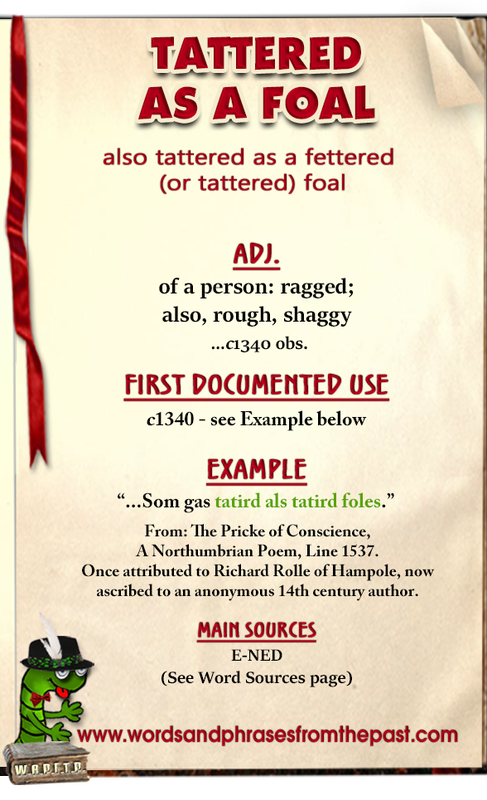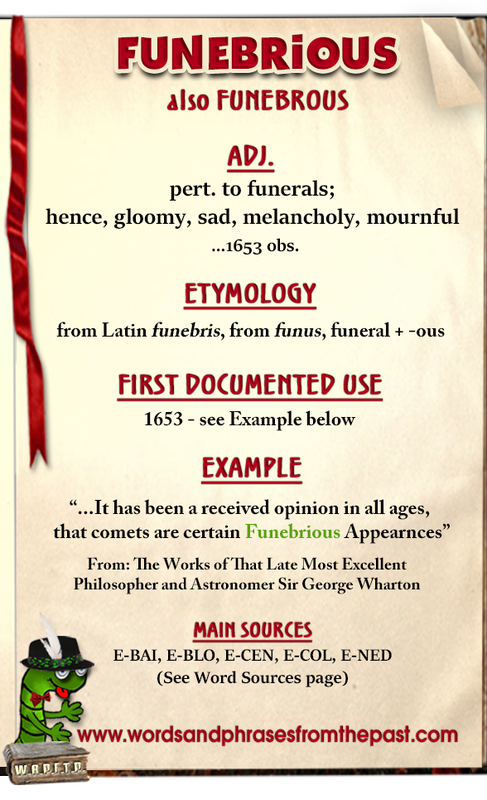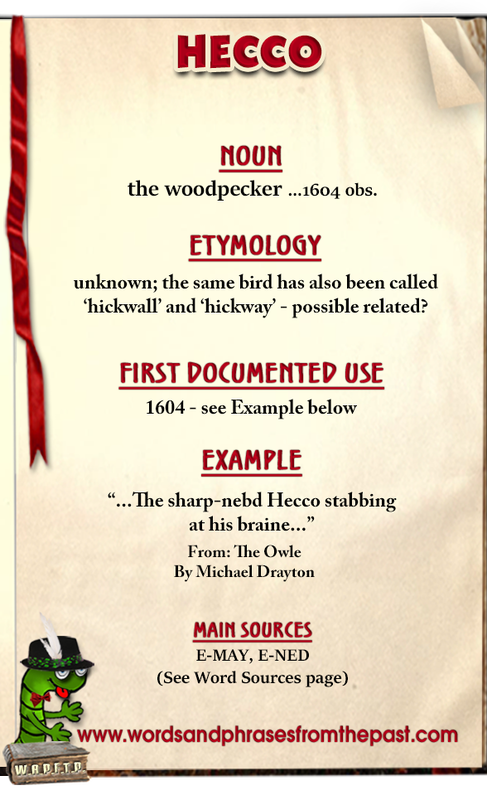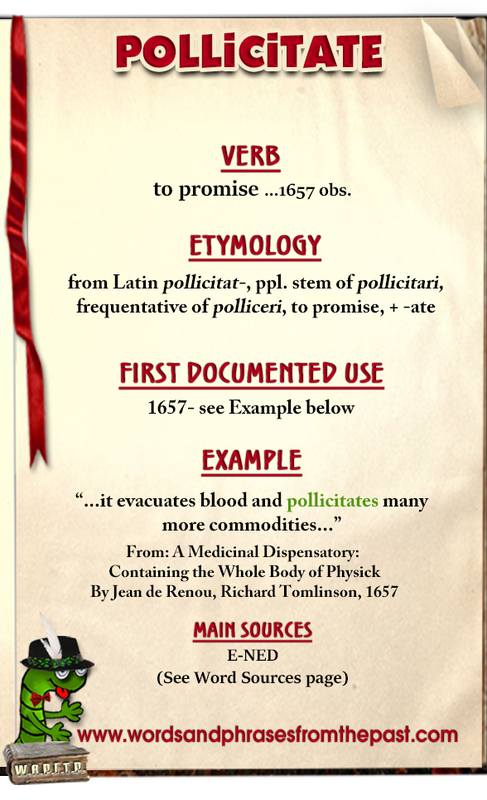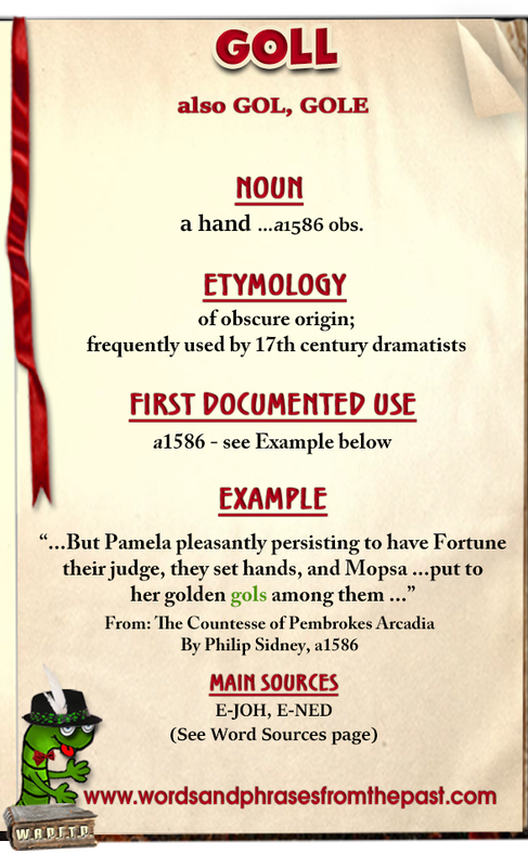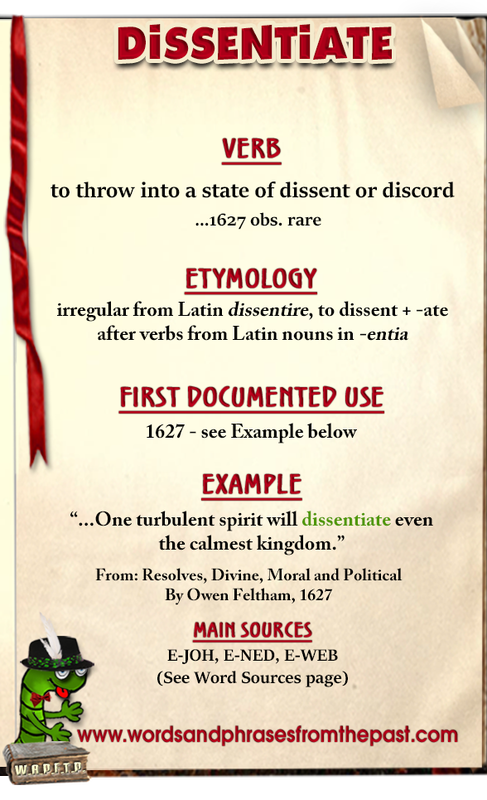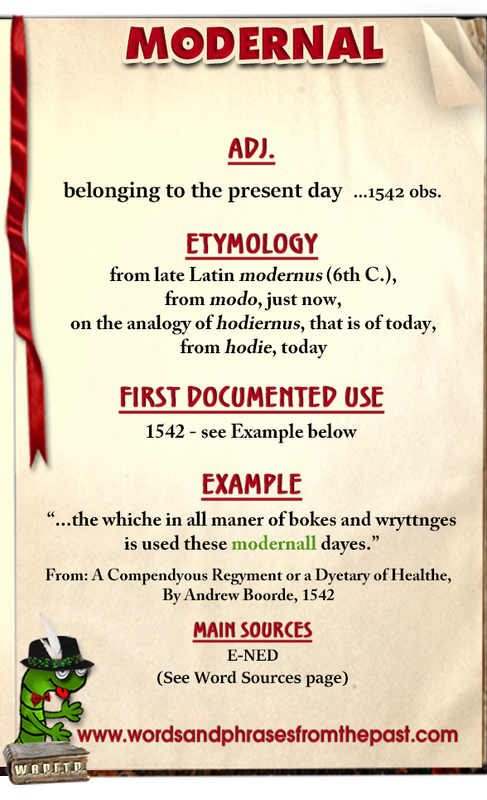MOMENTANEALADJ.
lasting but a moment; momentary ...c1610 obs. ETYMOLOGY from Latin momentaneus momentary + -al FIRST DOCUMENTED USE c1610 - See Example below EXAMPLE "...that which by nature and of necessitie is corruptible, transitorie, and momentaneall?" Written by "Some of the Auncient Fathers" SOURCES • A New English Dictionary on Historical Principles, James Murray, 1887-1933
0 Comments
SUBSANNATEVERB
to deride, to scorn, to mock ...1656 obs. ETYMOLOGY from late Latin subsannat- pa. ppl. stem of subsannare to deride by mimicking gestures, from sub- + sanna mocking grimace FIRST DOCUMENTED USE 1656 - Blount's Glossographia SOURCES • A New English Dictionary on Historical Principles, James Murray, 1887-1933 OBNIXIOUSLYADV.
earnestly; strenuously ...1632 obs. rare ETYMOLOGY irregular from Latin obnixe adv. strenuously, from obnixus struggled against, pa. pple. of obnixi to struggle or strive against FIRST DOCUMENTED USE 1632 - See example below EXAMPLE "...At the sight of each new Moone, (I speake it credibly) bequeath their Cattell to her protection, obnixiously imploring the pale Lady of the night, that shee will leave their Bestiall in as good plight, as shee found them." From: The Totall Discourse of the Rare Adventures and Painefull Peregrinations of Long Nineteene Yeares Travayles. from Scotland, to the most Famous Kingdomes in Europe, Asia, an Affrica By: William Lithgow, 1632 SOURCES • A New English Dictionary on Historical Principles, James Murray, 1887-1933 BRIBBLE-BRABBLEADJ.
chattering, garrulous; quarrelling ...1665 obs. NOUN vain chatter or wrangling; quarrelling ...?1868 obs. ETYMOLOGY reduplicated form on 'brabble', discordant babble FIRST DOCUMENTED USE 1665 - See example below EXAMPLE "...Teg. You are a foolish bribble-brabble woman, that you are." From: The Committee: Or The Faithful Irishman By: Sir Robert Howard, 1665 SOURCES • A New English Dictionary on Historical Principles, James Murray, 1887-1933 • A Supplementary English Glossary, O. Davies, T. Lewis, 1881 DULCESCATEVERB
to sweeten ...1657 obs. rare ETYMOLOGY irregular from Latin dulcescere to become sweet + -ate FIRST DOCUMENTED USE 1657 - See Example below EXAMPLE "...for art cicurates the wild, allayes the acerb, dulcescates the acid, incrassates the small ..." [cicurate - to tame, to make mild] [incrassate - to thicken] From: A Medicinal Dispensatory: Containing the Whole Body of Physick By Jean de Renou, Translated by R. Tomlinson, 1657 SOURCES • A New English Dictionary on Historical Principles, James Murray, 1887-1933 QUAUGHTVERB
to drink deeply ...1530 obs. rare ETYMOLOGY variant of quaft, quaff vb., or of Scot. 'waucht', to quaff, to drink deeply FIRST DOCUMENTED USE 1530 - See Example below EXAMPLE "...I quaught, I drinke all out. Ie boys dautant." From: L'esclarcissement de la langue francoyse By: John Palsgrave, 1530 SOURCES • A New English Dictionary on Historical Principles, James Murray, 1887-1933 • Dictionary of Obsolete and Provincial English, Thomas Wright, 1880 CIRCUMAMBAGIOUSADJ.
roundabout in speech, etc.; not keeping to the point ...1834-43 rare ETYMOLOGY from circum- around + ambages indirect or roundabout ways FIRST DOCUMENTED USE 1834-43 - See example below EXAMPLE "...Reader, thou mayest perhaps have thought me at times disposed to be circumambagious in my manner of narration." From: The Doctor By: Robert Southey, 1843-43 SOURCES • A New English Dictionary on Historical Principles, James Murray, 1887-1933 • A Standard Dictionary of the English Language, Isaac K. Funk, 1908 • The Century Dictionary and Encyclopedia, William Dwight Whitney, 1889-1891 • Chambers's Twentieth Century Dictionary of the English Language, Rev. Thomas Davidson, 1903 • The Progressive Dictionary of the English Language, Rt. Rev. Samuel Fallows, 1885 • A Standard Dictionary of the English Language, Isaac K. Funk, 1908 PAVIDADJ.
fearful, timid, shy, quaking ...1656 rare ETYMOLOGY from Latin pavidus, fearful, trembling, from stem of pavere, to quake with fear FIRST DOCUMENTED USE 1656 - Glossographia Anglicana Nova, or, A Dictionary Interpreting such Hard Words....., Thomas Blount, 1656; Pavid, fearful, timorous, quaking, starting EXAMPLE "...That Dread and pavid manlessness, that seised the Inhabitants..." From: A Short Narrative of the Late Dreadful Fire in London By Edward Waterhouse, 1667 SOURCES • The English Dialect Dictionary, Joseph Wright, 1898-1905 • The New and Complete Dictionary of the English Language, John Ash, 1795 • A Supplementary English Glossary, O. Davies, T. Lewis, 1881 • A Standard Dictionary of the English Language, Isaac K. Funk, 1908 • The Imperial Dictionary of the English Language, Rev. John Ogilvie, 1847-1850 • Webster's International Dictionary of the English Language, Noah Porter, 1895 SHAG-BAGADJ.
shabby and worthless; poor in quality ...1888 colloq. NOUN a poor, shabby or worthless fellow; an idle, ragged vagabond ...a1700 colloq. VERB to loiter, to lounge about, to shirk work ...B1900 Eng. dial. ETYMOLOGY a jingling alteration of 'shake-bag' - a rogue, scoundrel (obs.) FIRST DOCUMENTED USE a1700 - A New Dictionary of the Terms Ancient and Modern of the Canting Crew, B.E. (Gent), 1899 - Shag-bag a poor, shabby fellow SOURCES • A New English Dictionary on Historical Principles, James Murray, 1887-1933 • An Universal Etymological English Dictionary, Nathan Bailey, 1737 • The English Dialect Dictionary, Joseph Wright, 1898-1905 • A Glossary of Provincial and Local Words Used in England, Francis Grose, 1839 RUMPLE-TUMPLEVB.
to roll; to roll in play down a declivity ...1885 Scot. ETYMOLOGY form of English 'rumble' and 'tumble' FIRST DOCUMENTED USE 1885 - See Example below EXAMPLE "...When I, a gilpy thing, Did rumple tumple doon the brae And dance the jing-go-ring." From: Modern Scottish Poets By D.H. Edwards, 1885 SOURCES • The English Dialect Dictionary, Joseph Wright, 1898-1905 • A Scots Dialect Dictionary, Alexander Warrack, 1911 COCK-A-LOFTADJ.
affectedly lofty, stuck up, conceited ...1862 colloq. ETYMOLOGY formed by vague association with cock (vb. to behave boastfully or defiantly, to swagger, to strut), and such compounds as 'cockalorum', 'cock-a-hoop', 'cock-horse' FIRST DOCUMENTED USE 1862 - See Example below EXAMPLE "...Some rubbishing cock-aloft notion of 'doing right!' " From: Mrs. Halliburton's Troubles By Mrs. Henry Wood, 1862 SOURCES • The English Dialect Dictionary, Joseph Wright, 1898-1905 • A Glossary of the Dialect of Almondbury and Huddersfield, Rev. Alfred Easther, 1883 • Slang and Its Analogues Past and Present, John S. Farmer, W.E. Henley, 1891-1902 • The Routledge Dictionary of Historical Slang , Eric Partridge, 1973 GILKIENOUN
a lively young girl ...1836 Scot. ETYMOLOGY unknown FIRST DOCUMENTED USE ?1836 - See Example below EXAMPLE "Nor did the screechin gilkies lack ornaments to set off their fair persons." From: Tales of the Borders, and of Scotland, Historical, Traditionary, and Imaginative, Vol. III By John Mackay Wilson SOURCES • The English Dialect Dictionary, Joseph Wright, 1898-1905 • A Scots Dialect Dictionary, Alexander Warrack, 1911 Yet again, I am changing how I am going to present the words. Sorry all, but due to some still having problems reading the current format, and others saying the load time for the blog page(s) is getting longer, I am now just going to use text. Cheers! SUPPLODEVERB
to stamp with the feet; to make a great noise with the foot ...1623 obs. rare ETYMOLOGY from Latin supplodere, stamping strongly, from sup- = sub- + plaudere to plaud = to applaud, praise FIRST DOCUMENTED USE 1623 - The English Dictionarie, or an Interpreter of Hard English Words, Henry Cockeram SOURCES Dictionary of Early English, Joseph Shipley, 1955 A New English Dictionary on Historical Principles, James Murray, 1887-1933 |
Archives
September 2021
|
